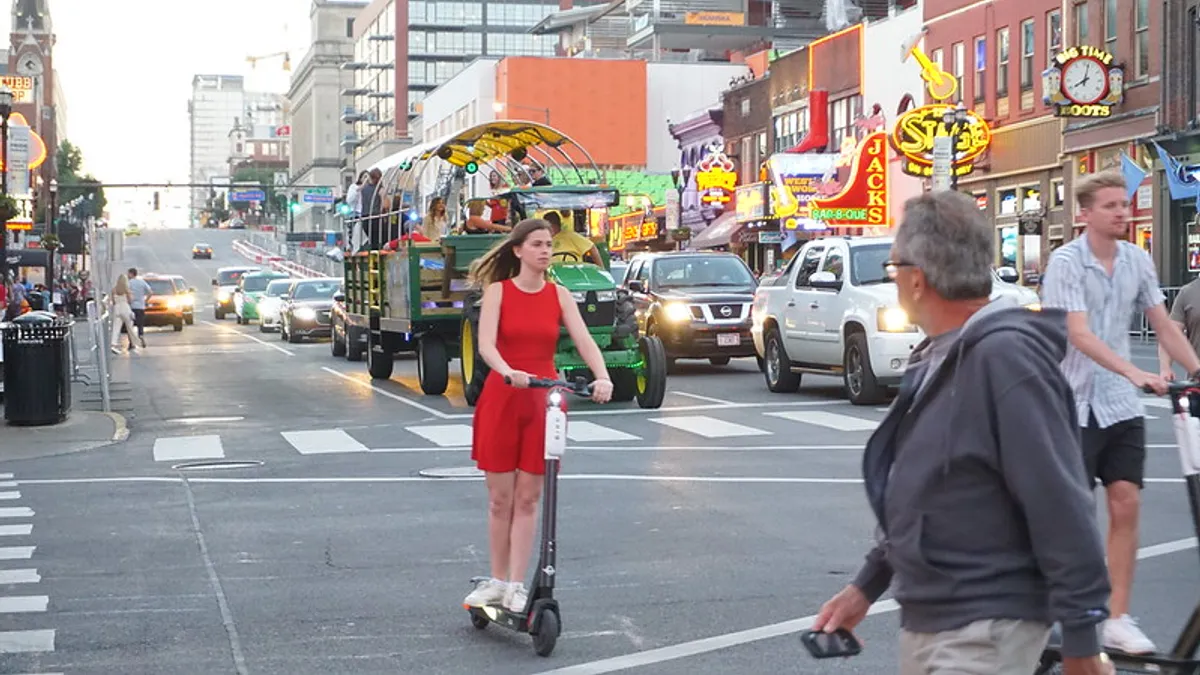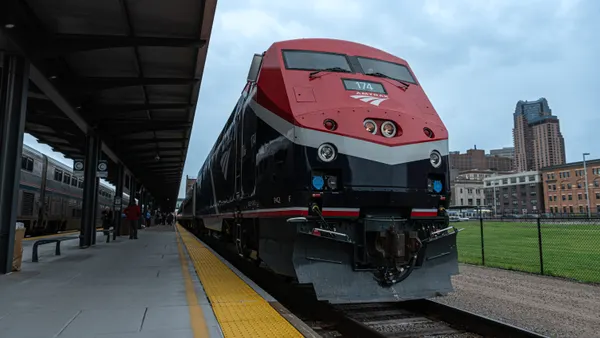Dive Brief:
- Researchers from the University of Tennessee at Knoxville (UT) and Portland State University (PSU) are launching a study to explore the impacts of the novel coronavirus (COVID-19) on shared bike, shared scooter and transit systems in Nashville, TN and Portland, OR.
- The study will survey several thousand people for about six months, to gather information on rider behaviors amid COVID-19, and rider preferences as cities move into recovery. Data from the semi-regular surveys will be fed into a live dashboard available for the researchers and their partners to analyze as the study takes place, Chris Cherry, researcher and engineering professor at UT, told Smart Cities Dive.
- The researchers partnered with Nashville's WeGO transit agency; the Portland-area's TriMet transit agency; the City of Portland's Bureau of Transportation (PBOT); micromobility operators Bird and Spin; Portland's bike-share system BIKETOWN; and the Transit app to better share data and assess holistic mobility trends in the respective cities.
Dive Insight:
The pandemic has turned transportation and mobility on its head as riders avoid public spaces and operators struggle to stay afloat. Cherry said the purpose of this study is two-fold: to better understand how systems respond to and work through economic and health shocks, and to better understand how micromobility and transit offerings can complement each other, particularly amid a future crisis.
For the research, Cherry connected with John MacArthur, a sustainable transportation program manager at PSU's Transportation Research and Education Center (TREC), thanks to an existing relationship from studying micromobility trends together. Cherry's colleague Candace Brakewood, an assistant professor of engineering at UT, is an expert in transit and joined the team as a third researcher on the project.
The team quickly committed to the study and pitched a grant proposal to the National Science Foundation's Rapid Response Research (RAPID) program, which supports non-medical research to better understand the science of COVID-19 transmission and the impacts it has on everyday society. The team won a RAPID grant to fund the study.
The initial survey hasn't been released yet, though Cherry said they hope to launch it soon to "capture people in the peak of lockdown." While Tennessee Gov. Bill Lee begins to reopen the state, Nashville Mayor John Cooper extended his city's stay-at-home orders through May 8, which may give the researchers some time to capture pre-recovery data. Over in Oregon, some cities and counties could reopen as soon as May 15, but Portland likely won't be among the first to see restrictions lifted.
Until more data is released from studies like this one through the recovery period, it's hard to predict what will happen to micromobility or transit post-coronavirus. Spin President and Co-Founder Euwyn Poon recently told Smart Cities Dive there will be a "resurgence in folks rediscovering or discovering micromobility," yet that prediction doesn't look promising as many operators — especially those that are VC-funded — have issued significant lay offs and restrictions to operations.
MacArthur said he has noticed a "dramatic" increase in the costs of scooter rides over the last year, which he believes is having an impact on riders currently and will play a significant role in ridership amid recovery. “I just don't know if people are going to be willing to pay what they were paying for a scooter ride coming out of this," he told Smart Cities Dive.
And while there's hope public transit will see ridership spike as cities "return to normal," it may take time as city dwellers slowly become comfortable in crowded spaces. Cherry said the researchers may notice a ridership spike in micromobility before transit, due to the ability to maintain social distance on a scooter or a bike.
Cherry and MacArthur both touted Nashville and Portland as ideal ecosystems to study scooter behaviors and trends — Portland is a big city with a mix of transportation modes similar to major cities, while Nashville is smaller and comparable to more car-dominated cities, MacArthur said. However, the researchers are open to other partners joining the study. Those interested are asked to contact the researchers directly.
To keep up with all of our coverage on how the new coronavirus is impacting U.S. cities, visit our daily tracker.













